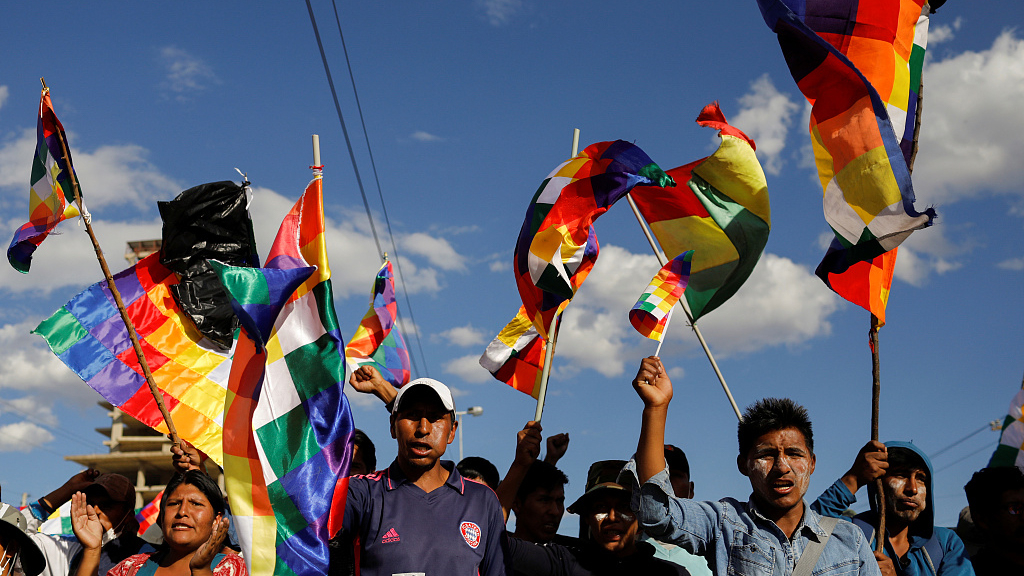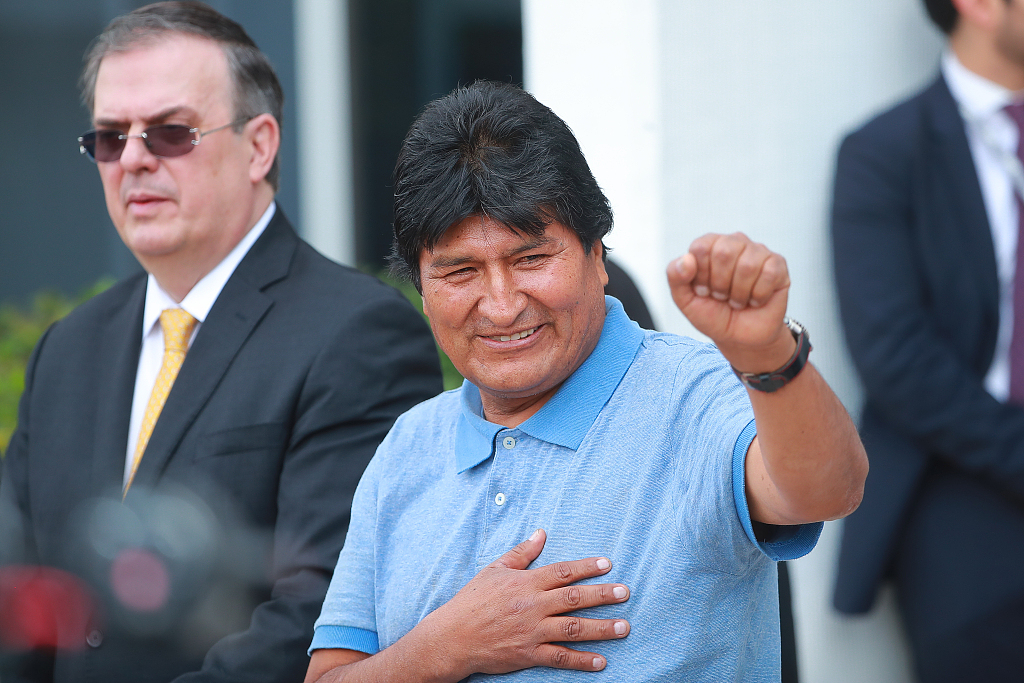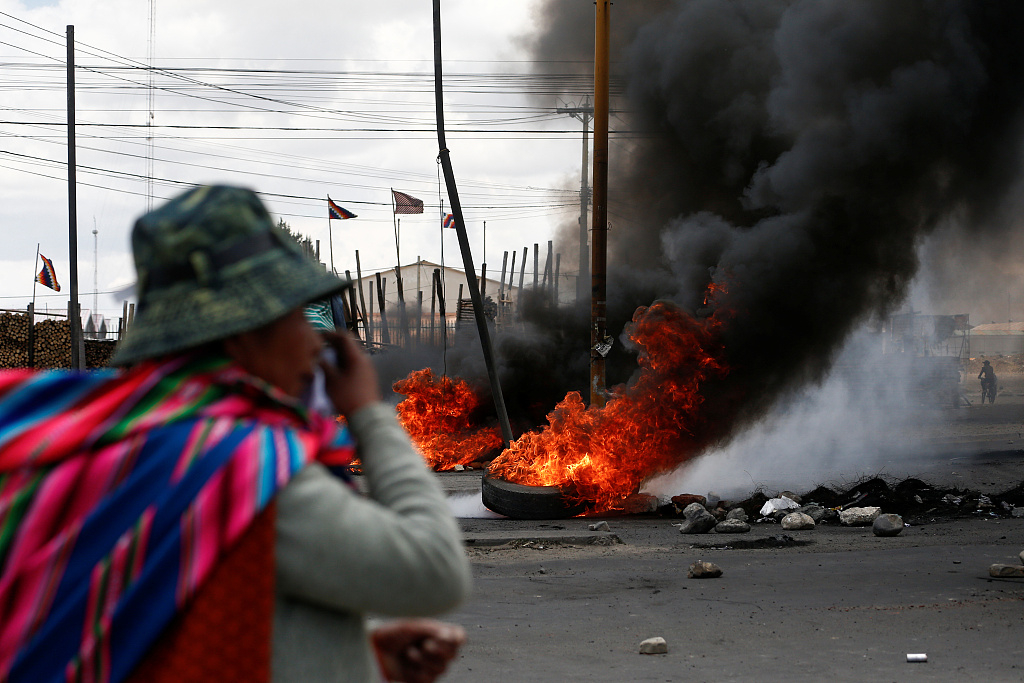25:51

Political analysts remain divided over whether this month's sudden ouster of Evo Morales as president of Bolivia was a coup.
On CGTN's political debate program, "The Heat", a divergence of opinions emerged as to whether Morales' surprise resignation and flight into exile under pressure was the result of an unconstitutional process.
Bret Gustafson, an associate professor of anthropology at Washington University in the American state of Missouri, is in no doubt that it was.
He argued on the program that the military's request for the leftist Morales to step down met the basic definition of a coup.
The president quit on November 10 amid anti-government demonstrations and rising pressure over vote-rigging allegations after an audit by the Organisation of American States (OAS) found serious irregularities in last month's election.
Gustafson disagreed with the stance of Fernanda Wanderley, director of the Institute of Socio-Economic Research at the Bolivian Catholic University, who contended that the rushed departure of Morales was the result of spontaneous mobilization across the country "against the abundant evidence of irregularities around the election".
Maduro ally
He has been replaced on an interim basis by Jeanine Anez, a conservative senator who has wasted little time in seeking to chip away at the policies of the labor leader who was regarded as Bolivia's first indigenous president.
She expelled hundreds of Cubans and Venezuelans who were working in the country and broke ties with Venezuela, whose president, Nicolas Maduro, is a long-time ally of Morales.

Former Bolivian president Evo Morales greets the press as he arrives at Mexico City's Benito Juarez International Airport after accepting political asylum granted by Mexico, November 12, 2019. /VCG Photo
Former Bolivian president Evo Morales greets the press as he arrives at Mexico City's Benito Juarez International Airport after accepting political asylum granted by Mexico, November 12, 2019. /VCG Photo
Speaking from Mexico, Morales, who had been in office for almost 14 years, himself called the announcement of Anez's accession to power "the most disastrous... coup in history".
Some, like Gustafson, believe the Anez government's main job is to organize fresh elections, rather than make new policy.
"They do not have a mandate to change policy," he said. "Their mandate is to call for elections."
Martin Mendoza-Botelho, a Bolivian who is an associate professor of political science at Eastern Connecticut State University, acknowledged that Morales was still the legitimate president of Bolivia when the army intervened as his term would not have expired until January.
But Mendoza-Botelho doesn't consider his removal a coup "because there hasn't been a breach in terms of constitutional norms" as they were all adhered to.
He said while it could be argued the army had crossed the line, their formal request for Morales to go gave some transparency to the process.
He noted that the country's constitutional tribunal (court) also accepted the transition of power.
Continuing protests
Arthur Estopinan, a former U.S. congressional aide who now works with the Estopinan Group, a political consultancy company, insisted that Morales had lost the election, even though the official results gave him 47 percent of the vote with his nearest challenger securing 36.5 percent.
Gustafson countered this by saying that the jury is still out as to whether the alleged fraud would have made a significant effect on the final count.

A fire rages during a protest in Senkata, El Alto, Bolivia, November 19, 2019. /VCG Photo
A fire rages during a protest in Senkata, El Alto, Bolivia, November 19, 2019. /VCG Photo
"I don't think it was fair to say he lost the election because the whole process was cut short," the anthropologist said.
Going forward, there was skepticism that the crisis will end quickly as demonstrations are still continuing.
The supporters of Morales have ramped up protests, calling for Áñez to step down. Mounting violence in the South American nation has seen more than 20 people killed in street clashes.
Panelists cited entrenched positions of the caretaker president on the one hand, and the congress, which is controlled by lawmakers from Morales' Movement for Socialism, on the other.
The UN Secretary-General has dispatched his personal envoy in efforts to bring about a peaceful resolution to the crisis.
Gustafson said he hoped that a space can be created in which dialogue can happen but Mendoza-Botelho expects instability to continue whoever assumes the presidency.
(The Heat, a 30-minute news talk program on CGTN hosted by Anand Naidoo, airs Monday to Saturday at 2300 and 0630 GMT.)